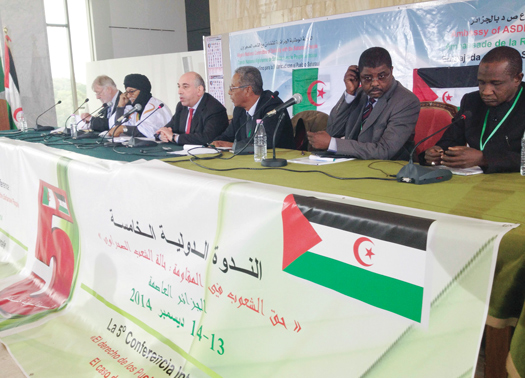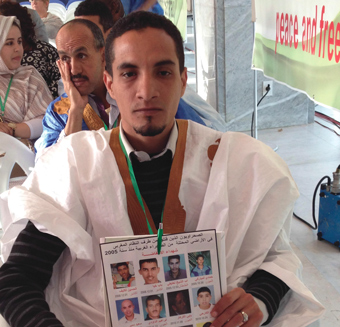
Nearly 400 people participated in a recent conference calling for a referendum to decide the fate of the Western Sahara, which is supported by UN resolutions. Photos: Richard B. Muhammad
|
ALGIERS, Algeria – The thawing of U.S.-Cuban relations has inspired hope thousands of miles away for those seeking self-determination for Western Sahara, a small nation called Africa’s last colony.The announcement of U.S. moves to normalize relations with Cuba came just after an international conference here devoted to the plight of the Saharawi people who are native to Western Sahara. Saharawis find themselves in political shackles despite UN resolutions affirming their right to decide their future. They have waited for decades to vote to decide if this traditionally nomadic people wants to integrate into Morocco, claim autonomy under Moroccan rule or choose independence.
At the conference, held here Dec. 13-14, the Saharawi expressed hope that President Obama would speak to their struggle and their right to choose how they will live.
With the American president making the historic and politically risky move of reaching out to Cuba, a few words calling for respect for international law and respect for human rights would go a long way for the Saharawi struggle, officials said.
In an end-of-conference declaration, an appeal was made for America to take a stance and blunt the influence of France, which has protected Morocco’s illegal occupation. France benefits from businesses that loot the resources of Western Sahara, including phosphates, gold and fish, said activists and officials who constitute a kind of government in exile.
Saharawis shared stories of beatings, abuse, politically-motivated jailing and rapes at the “Fifth International Conference: People’s Right to Resistance—The Case of the Saharawi People,” which included sessions at the El Aurassi Hotel and Algeria’s ornate Palace of Culture. Nearly 400 people, who represented groups, governments and individuals took part in conference discussions and presentations. Peaceful demonstrations by Saharawis in Moroccan-controlled territory bring brutal beatings, imprisonment and torture, said officials and torture survivors.
Western Sahara should have been able to decide its fate in the 1960s as others did coming out of Africa’s colonial period. Instead Spain, France, Morocco and Mauritania—who laid claim to Western Sahara—crafted a pact that derailed self-determination. War broke out. Mauritania eventually left but Morocco stayed. Morocco and the Polisario Front, the Saharawi liberation movement, signed a ceasefire that was supposed to include the referendum. That was in 1991, voting has yet to happen. Algeria has supported Polisario and the Saharawi struggle.

During conference in Algiers, an advocate for self-determination for Western Sahara holds-up a poster with photos of Saharawi activists allegedly jailed by Moroccan authorities.
|
The Final Call was part of a nine-member press and academic delegation that attended the conference and spent time in Saharawi refugee camps outside Tindouf, Algeria. The delegation was organized by the Institute for the Black World 21st Century and led by Don Rojas, who has a history of involvement in international affairs and struggles for Black self-determination.“This is a great opportunity for President Obama to write another chapter into his legacy by being the first U.S. president in over 50 years to being normalizing relations and Cuba but also an opportunity to close the last chapter in the long history of colonization on the African continent,” said Mr. Rojas.
Signaling support for basic democratic rights for the people of Western Sahara is the right thing and presents no downside to Mr. Obama because it is consistent with U.S. democracy to recognize the right for Saharawis to vote for their own future in an open referendum, he added.
“In 2015 the world is changing but Western Sahara remains in this condition of colonialism and it is reprehensible. For the first African American president to go on record for a vote for their destiny would be welcomed in the U.S., in the African American community and people of good will who respect the principles of independence,” said Mr. Rojas. How can a democracy and a superpower ignore people whose human rights are violated daily? he asked.
Cuba is one of the nations that has supported the Saharawi struggle and Polisario, their movement for liberation and armed struggle with Morocco. The group has been engaged in a ceasefire since 1991. Cuba and Western Sahara are also former Spanish colonies.
Backed by France in the UN Security Council, Morocco has ignored UN mandates that call for a referendum going back to the 1970s. Polisario controls small portions of Western Sahara and administers refugee camps in nearby Algeria while Morocco controls the majority of the territory. The territories are separated by a huge wall and heavily mined area that stretches along 1,600 miles. Morocco’s historic claim to Western Sahara have been rejected by international bodies, including the International Court of Justice and United Nations.
Lucy Offiong’s Nigerian Labour Congress has been involved in the Saharawi struggle for eight years. Her organization supports Saharawi self-determination. The trade union lobbied Nigeria’s government to receive the president of the Western Sahara and Nigeria made commitments to press the United Nations to resolve the problem through the African Union, she said. Morocco, however, is not a member of the African Union because of the occupation of Western Sahara, she said.
Africans see themselves as brothers so to see one brother oppressing another is distressing, said Ms. Offiong whose Nigerian Labour Congress has about 20 million members.
African nations with some representation at the conference included South Africa, Mozambique, Senegal, Tunisia, Mauritania, Ghana, Togo, Mali, Burundi, Rwanda, Chad, Egypt, Niger, Angola, Burkina Faso, Rwanda, Zimbabwe, Kenya, Tanzania, Benin, Congo, Nigeria, Guinea, Cote D’Ivoire, and Congo Brazzaville.
Suzanne K. Scholte, who has done extensive work on Western Sahara, sees the problem clearly as Morocco’s violations of international law, Morocco’s ability to pay to exert influence and inaction by the United States. The ability of permanent Security Council members, like France, to stifle legitimate action was called another reason for the body to be expanded and reformed.
Mohammed Abdelaziz, president of the Western Sahara, and other speakers appealed for support, saying Western Sahara’s existence is recognized by the United Nations, the European Union, the African Union and countries around the globe. “We need a free, fair and just referendum to exercise the right of self-determination to create an independent state,” President Abdelaziz said.
The conference included 360 participants from 49 countries and included political figures, rights activists, diplomats, academics, non-governmental organizations, journalists and lawyers.
Saharawi speakers and their supporters said 49 political prisoners are held in seven Moroccan jails and about 526 Saharawis have been kidnapped or have disappeared. Independent journalists are not allowed in Western Sahara and Morocco uses its riches and French support to blunt media coverage, they added.















